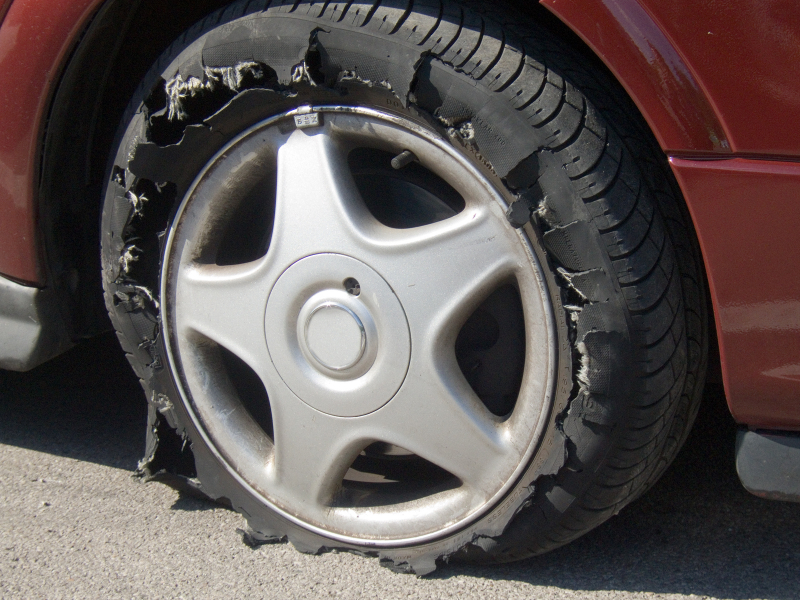 Summertime in New York comes with heatwaves, power outages, and, often only to our annoyance, tire pressure issues. The more our vehicles are on the road when temperatures spike, the more likely that our tires’ pressure will increase. Now sometimes this only amounts to a quick pit stop at a gas station to fix the issue, but sometimes it can lead to devastating accidents.
Summertime in New York comes with heatwaves, power outages, and, often only to our annoyance, tire pressure issues. The more our vehicles are on the road when temperatures spike, the more likely that our tires’ pressure will increase. Now sometimes this only amounts to a quick pit stop at a gas station to fix the issue, but sometimes it can lead to devastating accidents.
What Causes Tire Blowouts?
Our tires are intricately designed to handle a large amount of wear and tear over the course of their lifecycles. If you are lucky, you only have to replace them every few years. However, in extreme circumstances, tires can burst, leading to serious car accidents as drivers lose control of their vehicles. These events can be extremely terrifying and can happen for several different reasons, such as:
Heat: Heat plays two roles in a tire blowout. First, the hotter a tire becomes, the more pressure will build up within it. This alone can cause a blowout, but hot roads can also increase the risk as the tire’s rubber begins to break down.
Balding: The older the tire, the less tread depth it has. When it is bald, or it has become worn down, the tire is at a higher risk of being punctured and bursting.
Tears or punctures: While you may notice that your tire has lost pressure immediately due to a screw or nail, some damage to a tire can be more subtle. You may end up driving around for a few miles without noticing that your tire has been damaged. When combined with hot asphalt, these tears or punctures can cause the tire to explode.
Low pressure: Over pressurizing a tire is a major cause behind tire blowouts, but a lack of pressure can also contribute to them. When a tire is underinflated, the side of the tire takes on more weight from the car, causing minor damage along the rim. This can cause the rubber to break down and eventually explode.
Defective designs: Sometimes the blowout is not the cause of a lack of maintenance or wear and tear, but a design defect. Defective tires can take many forms, but the most common is tread separation, which occurs when the rubber of the tire is not fully sealed to the rim. Eventually, this can lead to a blowout.
Liability in Tire Blowout Accidents
Tire blowouts are scary affairs and can leave you shell-shocked. You may not understand what just happened to you, whether you were the one driving the vehicle, a passenger, or were struck by a car. In addition, the injuries you sustained can be extensive. A full medical review by a professional will be necessary to rule out any lasting damage and, if you are catastrophically injured, help you determine the proper course of treatment.
In addition to receiving treatment, you may also have questions about filing a claim. If you were struck by another car, you would assume that you can file a claim against their insurance policy. In turn, if you were the one driving and hit another vehicle or fixed object, you would also assume that you are the one to blame or that your collision coverage should apply.
However, tire blowouts are complicated affairs. In New York, we expect each driver to maintain their vehicle and replace any tire that has become worn down. Thus, if the tire only burst because the driver failed to get it repaired or replaced, then they could be found at fault.
But what if the tire was in a seemingly good condition? Then the accident requires a more in-depth investigation. A skilled accident reconstructionist may discover that the tire had an automotive defect, meaning the manufacturing is at fault for improperly manufacturing or designing the tire. Or the blame could be placed on the mechanic who installed the tire incorrectly. In addition, a tire retailer might also be found liable if they sold a product that they knew was defective and should have been recalled.
In any case, you will want to have your accident reviewed by a knowledgeable New York car accident attorney. At Wingate, Russotti, Shapiro, Moses & Halperin, LLP, our legal team of experts have experience working with multiple types of car accident claims, from traditional cases where the driver is at fault to more complex auto product liability claims against negligent manufacturers. If you have suffered injuries due to a tire blowout that was not your fault, reach out to us at (212) 986-7353. We can explain whether or not you have a case and how to file a claim for compensation.